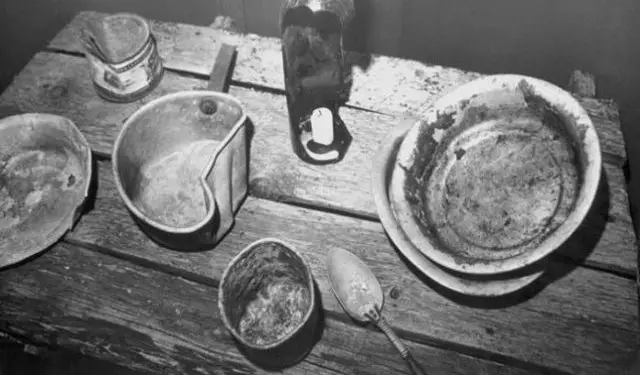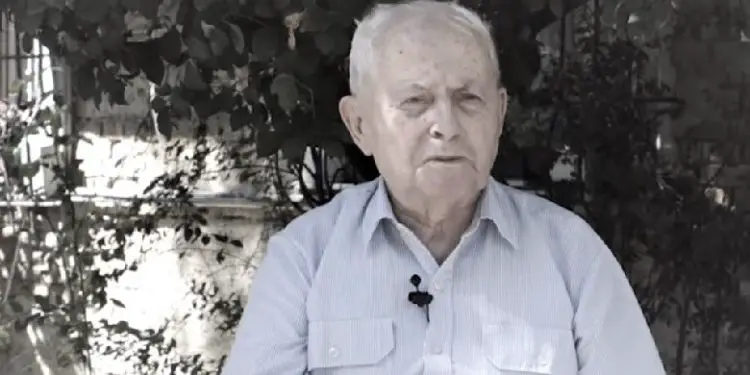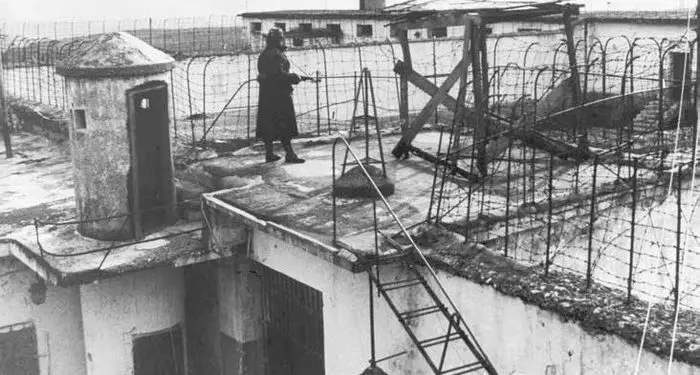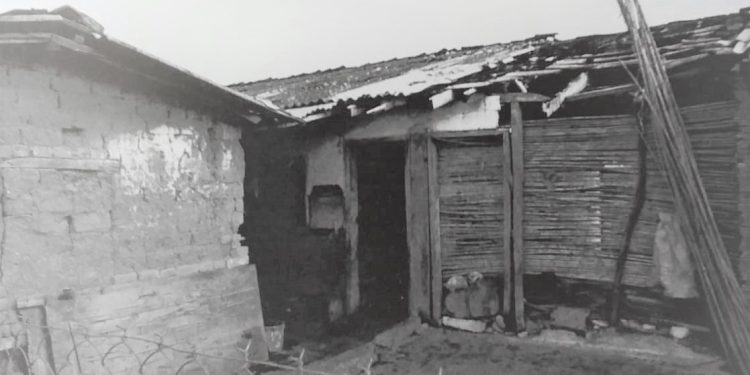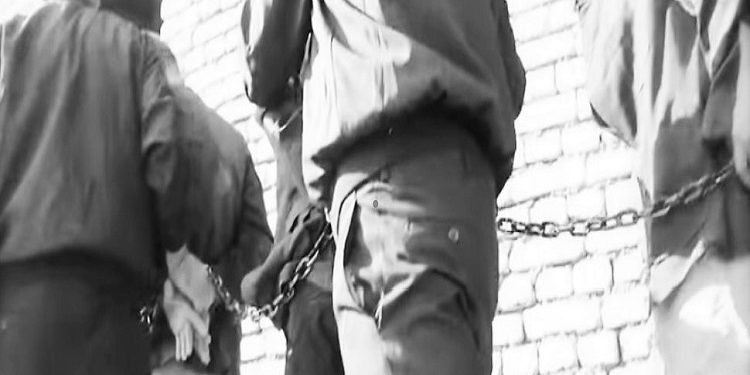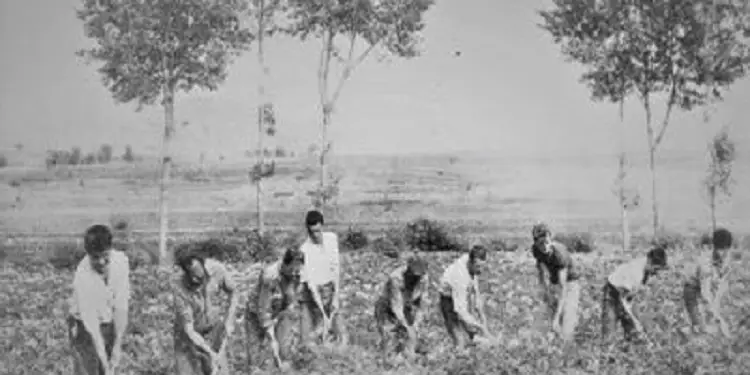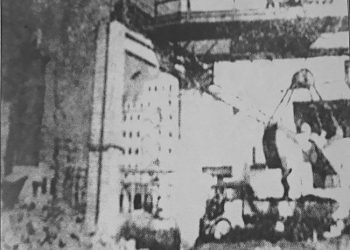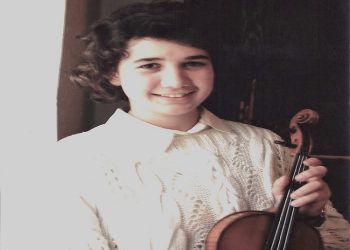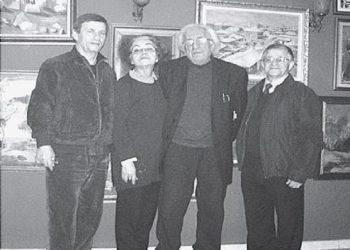From Agim Musta
Part seventeen
Memorie.al / On the fourth anniversary of the passing away of the well-known historian, researcher, writer and publicist Agim Musta, (July 24, 2019), former political prisoner, his daughters Elizabeta and Suela, gave him the right to exclusivity for the publication, by the online media Memorie.al, of one of the author’s most prominent publications, such as the ‘Black Book of Albanian Communism’. This work contains numerous data, evidence, facts, statistics and arguments unknown to the general public, on communist crimes and terror in Albania, especially against intellectuals, in the period 1945-1991. The publication for the first time of parts of this book is also the realization of one of the bequests of the historian Agim Musta, who, from the beginning of 1991 until he passed away, for nearly three decades was engaged with all his powers, working to raise collective memory, through book publications and publications in the daily press. All that voluminous work of Mr. Agim Musta, concretized in several books, is a contribution of great value to the disclosure of the crimes of the communist regime of Enver Hoxha and his successor, Ramiz Alia. A good part of the publications of Mr. Agim Musta, is also translated into English. Thanking the two daughters of the late Musta, who chose Memorie.al, to commemorate their father, from today we are starting the publication, part by part, of the “Black Book of Albanian Communism”.
Continues from last issue
-Portraits of fellow sufferers-
(1945-1991)
- The doctor with a heart of gold
My father had told me about Dr. Miço Konomi, many years before I knew him. Black fate brought me together with him, for a long time, in the prisons of the communist dictatorship. He was a Greek minority. He was born in 1906, in Dhivër village of Saranda. He completed his higher studies at the University of Athens, at the Faculty of Medicine. He graduated with honors as a general practitioner. They offered him a job in Greece, but he decided to return to Albania, where you first saw the light of the sun. He asked to work as a doctor, in an area far from the minority, in order to learn the Albanian language well. He started working in Kruja in 1929.
He did not leave a village untouched. With his humane work and ready day and night to serve in the most difficult areas: Kurvelesh, Skrapar, Myzeqe, etc., he had saved hundreds of people from the clutches of death. Wherever he served, he made many friends and admirers. His name and work aroused the resentment of the organs of the dictatorship. They put pressure on him in various ways, to make him a collaborator of the Security authorities. His refusal served as a reason to arrest him. They sentenced him to 10 years in prison for “agitation and propaganda”. They were not satisfied with that, but sentenced both the son and the son-in-law to 20 years in prison. Even this great pain did not defeat Dr. Miço. He never stopped serving fellow sufferers, regardless of religion or region.
Often, with his savings, he bought medicines for sick convicts who had no help. Although the command of the prisons never allowed him to serve in the camp ambulance, he stood over the sick prisoners day and night. His word was balm and affected the sick, more than the drugs we took. They called Dr. Micho, “Doctor with a golden heart.” He enjoyed the respect and love of all the prisoners.
The sufferings of the prisons and family troubles aged Dr. Miço prematurely. When he finished his sentence, he was again sentenced to 10 years in prison. The dictatorship feared his release. He had to die in prison. After serving 18 years in prison, at the age of 72, he fell seriously ill. The command made no effort to cure him. He died in the Kobzi prison of Burrell and was buried in the common pit. His name remained in the hearts and minds of political convicts, as a symbol of humanity.
- Is Prof. killed? Loci?
Prof. Dr. Loci was one of the best surgeons, not only in Italy, but also in Europe. His highly successful surgical interventions made him famous during the thirties. His fragile and noble appearance commanded respect from the first meeting. He hated fascism and was disturbed by the hysterical chants and shouts of the alalas. His student, the Albanian doctor Gjergji Doko, proposed to him to come to Albania, because perhaps he would feel more at ease. Loci accepted the proposal with pleasure. He settled in Tirana at the beginning of 1940. He worked as a surgeon in the state hospital and in his private clinic on “Fortuzi” street (today Asim Vokshi Street).
“It was lucky for Albania and for us, his students that Professor Loci came to Albania. He was a rare talent. We Albanian doctors learned a lot from him” – says the well-known surgeon Maksut Dërrasa. Tirana and especially the mountain of Dajti, fascinated Loci. He spent the last days of the week in Dajt, hunting.
The scalpel in the hand of Dr. Locit, turned into a magical instrument. Within five years, he had performed thousands of surgeries. He had operated not only Albanians, but also Italians, Montenegrins, Greeks and Bulgarians. He risked his life several times, operating in secret with many illegal anti-fascists and leaders of the Albanian Communist Party.
It never occurred to him that one day, for all that he had done to save people’s lives, and he would be rewarded with bullets in the back of the head. He was arrested at the end of 1945, on the charge that he had hidden a quantity of gold from his savings in the stomach of a corpse that was being sent to Italy. This accusation was used as a facade to deceive the naive. In reality, prof. Loc, other things were required of him.
He did the investigation in the mysterious building of the Security, (“House with Leaves”), near the Central Post Office of Tirana. They tortured him cruelly and asked for his connections with SIM and with the Anglo-American missions that came to Tirana at that time. The investigations were led by Major Vangjo Mitrojorgji himself, the former head of Tirana Security.
No torture was left unused upon that luminary of surgical science. A former prisoner, who had stayed in the same cell, after the sentence of prof. Loci, tells that he had read a sentence there, which said: “Sono inocente come un angelo” – Loci. (I am innocent, like an angel).
They also arrest his doctor friend, Gjergi Dako. He could not bear the torture and ended his life by hanging himself with his shirt. Prof. Loci, many countries of the world would be honored if he were in their country. It is said that after the death sentence, Loci asked to be spared his life and promised to work in Albania as long as he was alive.
But where did the madmen listen to you?! Albania did not need scientists! Speak, people, was Professor Loci killed?!
- The world-famous geologist, Stanislav Zuberi
“Crime in Tirana of tyrants”. This is what the writer Petro Marko called the murder of the world-famous Polish geologist, Stanislav Zuber. Yes, who was the scientist Zuber? He was born in Poland, in the city of Leopol in 1891, in an intellectual family. He studied geology at the University of Krakow and completed them with flying colours.
Worked on the four continents of the globe to discover black gold (oil). Where didn’t Zuber’s foot step?! In Venezuela and in Russia, in the Persian Gulf and in Egypt, in Italy and in the Balkans. He was respected everywhere. Zuberi, very modest, stayed away from pompous praise. He was busted in Baku. At Bander Abaz in Persia, the first oil refinery was named after him.
Stanislav Zuberi was small in stature, but had a genius mind. He was a world-class scientist. He knew nine foreign languages, among them Albanian, which he spoke perfectly. It had an encyclopedic culture. When his fame took hold, the Faculty of Geology in Krakow was named “Stanislav Zuber”. In 1927, Zuberi came to Albania for the first time.
He discovered oil layers in Kučovo and Patos, working for the Italian company “AGIP”. During 1930, he did research for oil discovery in the area of Korça and Berat. He left Albania in 1931, to continue the interrupted work in Syria, Iraq, Palestine and Egypt, always in search of oil. He returned to Albania in 1936 and worked diligently to discover other oil-bearing layers.
His wife, the Italian countess, Matilda, also a geologist, was not separated from Zuber for a single moment in his work, until she died and was buried in Kučovo, (at the end of 1943), from an air bombardment. Severely injured by this irreplaceable loss, Zuberi, not only did not stop his work, but worked saying: “I am connected by many roots to the Albanian land. I will not leave Albania, even if death threatens me.”
Although anti-communist in ideas and a devout Catholic, he continued to work with the same vigor even during the communist dictatorship. He was eavesdropped step by step, until January 1947, they put him in handcuffs under the charge: “Agent of American imperialism”, along with Zuber, they also arrest the engineers Riza Alizoti, Sulo Klosi, prominent geological engineers, who were sentenced to death and were executed on the rope in 1947, the first in Kuçovo and the second in Rubik) and others.
During the special investigation, all kinds of torture were experimented on them, to admit that they had sabotaged the oil and geology sector. They were accused of having been placed at the service of Anglo-American foreign services, to sabotage the Albanian economy. Rizai and Suloja could not endure the torture for long. In order to escape excruciating pain, they affirmed what the executioner investigators were looking for. Death would be a golden balm before unbearable torture.
Zuber’s interrogators, Thoma Karamelo and Xhavit Struga, used special torture against him, in accordance with his small physique. In the middle of winter, Zuber was put in a barrel of water with pieces of ice. They hung him from the ceiling of the dungeon, with his hands on hooks, and left him like that for days. They hit him with the heels of his boots on his toes, breaking his bones.
Zuberi neither refused to admit what he had not done, nor did he die. He went crazy and went out of reality. However, they continued to torture Zuber, saying that he “pretended to be crazy and played the part that his masters had taught him”. One day the Tirana prison, where Zuberi was, was visited by the Minister of the Interior, (former tinsmith Koçi Xoxe), who was carrying the lieutenant general’s shoulder straps.
He wanted to see with his own eyes Zuber, in whom the Yugoslav “comrades” were so interested. Koçi sat heavily in the armchair, in one of the investigation offices. On either side of him stood, silent as tombstones, the investigators of the “sabotage group”.
The great, mad scientist was dragged by the wings. From his unsettled eyes, it was clear that Zuber could no longer be worked with. “Why don’t you tell the truth?” – asked the minister. – Who instructed you to hide the oil reserves? – continued Koçi Xoxe, raising his voice. Zuberi looked at the ceiling, made the cross and whispered some incomprehensible words. He he prayed to God, in his native language. “This is over,” Koçi said. – Get out of my sight”! When Zuber was removed, Koçi told the investigators: “You worked well with Riza Alizoti and the others.
They also admitted their guilt in court. With Zuber, you have made the job stink! You didn’t show yourself capable of extracting the secrets that you keep in that head that has Bozhigrad like an onion. Crazy, before he showed us what we needed. Yugoslav friends are very interested in Zuber. They keep asking us what Zuber says. What can I say to them, how did you tarnish the work?! I saw the Party’s bread as haram!” Vrik got up from the armchair and went outside, accompanied in silence by a group of Security officers.
Even after the meeting with the Minister of the Interior, they continued to torture Zuber. Investigators hoped that Zuberi would pick up the language. One day, one of the executioners kicked him in the head. His hemorrhaging erupted, like volcanic lava. He tried to cross himself one last time, but he couldn’t. The world’s great scientist, Stanislav Zuber, who had done so much for Albania, died insane and was brutally murdered by the Albanian communists.
- Ganimet
Ganimeti was one of the most beautiful women in Tirana. Her long and plump body was in complete harmony with the pink color of her face and her always smiling and tearful eyes. In addition to the beauty of the body, she also enjoyed the beauty of the mind. He had completed the “Queen Mother” school and mastered several foreign languages. She had never left a book unread and was very pleasant in conversation.
In 1945, an officer of the English Mission fell madly in love with her. He wanted to marry her, but was kicked out within 24 hours as an unwanted person. Ganimeti was arrested on the charge of “espionage” in the service of foreign powers. He was brutally tortured in the cells of the Security, while some of the officials of the Ministry of Internal Affairs tried to rape him. After some time he was released from prison, but they left him without a job, so that he would starve to death. To survive, he beautified the girls of Tirana on their wedding day.
He handled this job perfectly. Every evening, accompanied by her mother, she went for a walk on the big Boulevard. Hundreds of eyes looked at him with adoration and greed. She was constantly tapped. He felt despair, but he never showed it in the eyes of others.
He never bowed down and asked for mercy. On a rainy October day, in the early 1960s, a police truck stopped in front of her house, on “Rrugë e Dibra”. They forced her into the car, along with her old mother. She was deported to Grabian of Lushnja and designated an alcove, in a former pig stable.
The smell of urine pierced the nose and the holes in the unplastered walls were full of scorpions. The humidity penetrated to the core. Even during the day you had to keep the lamp on. Outside, knee-deep mud, you could only walk with boots. Ganimet was overwhelmed by extreme despair.
Like that, she couldn’t live anymore. No ray of hope was visible on the horizon. He racked his brains for several days and spent several sleepless nights to find a way out. He could not pierce the darkness. The only way out was death. And decided to die. She showed her mother her decision, and she hugged him trembling. “We will die together,” said his mother. “My first and then you.” Her mother’s words eased the tightness in her chest. She felt less sad, that she was leaving that life of misery. He went to the store and bought 10 meters of rope. He cut it into two equal parts and sat at the table, where he wrote a letter. What he wrote in that letter and to whom it was addressed, no one found out, except for the Security operative, who received it after their death.
After they drank coffee in longing silence, Ganimeti got on the table and hung two looped ropes on the beam of the former stable. She worked calmly and without trembling hands, as if decorating a bride. He put his mother on the chair, threw the noose around her neck and kicked the chair. The mother remained suspended in space.
She moved the chair a meter away, got on it, put the noose on her throat, clenching her teeth tightly, so that even when she died, she would remain beautiful. He knocked the chair down with his fingertips and she too was left hanging like a mother. Some children, who were playing in front of the stable, from the noise they heard, approached the door. They were stunned when they saw through the holes in the door, two women dressed in black, swaying in space.
The children alerted the exiled neighbors who lived in the same stable. They ran, tore open the door and froze in place, in front of the two corpses, which were still swaying. No one dares to approach them and bring them down to the ground. A boy ran to alert the police superintendent.
After an hour, he came together with the Security operative. With a demonic appearance, they released plumes of tobacco smoke onto the worried faces of the internees. They ordered a man to cut the ropes. They expelled everyone from the alcove and only the executioners and their victims remained there. Late in the evening, they buried them in a pit by a canal. No one put a flower or wrote a name on the pile of dirt…! Memorie.al
The next issue follows




